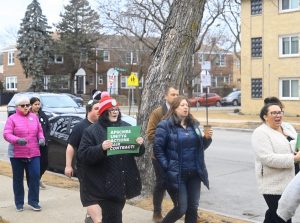Board of Trustees Overview
September 26, 2017
The financial situation at NEIU was relieved during the month of July when a state budget was finally passed. For two years, NEIU had no budget and struggled to keep afloat, implementing furlough days and laying off employees.
During the Board of Trustees meeting on Sept. 14, members analyzed the budget that the school received from the state.
Gov. Bruce Rauner vetoed the budget bill on July 4, but the Legislature overrode that veto on July 6. For Northeastern, the approved the fiscal year 2018 appropriation totals $33,209,000, a 10 percent decrease from the amended appropriation in the fiscal year 2015.
Tuition revenues and the state appropriation are the primary sources of funds for most universities, but for the fiscal year 2018, university officials projected that revenue will decrease due to the shortage of student credit hour enrollments and state support from the Illinois General Assembly.
As for the fiscal year 2019, the university will assume that they will receive the same appropriation from the fiscal year 2018 of about $33,209,000. However, the university will put in a request for the fiscal year, be totaling $92,310,300, in order to cover an increase in wages, construction and renovations to improve operating efficiencies, physical and technological infrastructure and systems.
One of these construction projects is an education building. The Daniel L. Goodwin College of Education resides within Lech Walesa Hall and plans to have an entire education building were made.
“About $73 million in funding for planning and construction was approved by the Illinois Legislature for the fiscal year 2010,” Vice President of Finance Michael Pierick said. “The university worked with an architectural firm in 2014 and 2015 to create a space that needs inventory, a building conceptual design, and a schematic design. The firm then began creating construction drawings and was about halfway through the construction drawing process when the governor halted the project on July 1, 2015.” The beginning of the state budget impasse delayed any further plans for the education building.
Currently, the university awaits whether or not the state budget will allow the revival of that program.
According to Vice President of Student Affairs Daniel Lopez, the Nest will be at full capacity as early as next fall. “The majority of [the residents] are freshmen. Most students live within the vicinity of the university.” Despite being a commuter school, there is a large number of students interested in staying in student-housing.
“What we were finding is that a large percentage of CPS students weren’t interested in Northeastern because they wanted a residence life experience. That was one of the reasons why President Hahs decided to bring a residence component to the university,” Interim President Richard Helldobler said at the meeting.
“The university is currently reviewing options for additional ‘phase two’ student housing. American Campus Communities was responsible for planning and developing The Nest, and oversees operations there. They have presented several options for additional housing,” Pierick said.
One of these options is to add a “wing” to the Nest, providing more rooms. A second is to develop housing on both sides of Bryn Mawr Avenue between Kimball Avenue and Bernard Street. The final option is to develop housing down Foster Avenue, but that would require to give up the athletic fields.
“Phase Two” of expanding the Nest would require the university to provide about 10 percent of the funding due to their partnership with American Campus Communities.
In addition, the board members approved a new master’s program in public health, a 42-credit-hour program that uniquely offers broad, master’s level training in public health via 36 required credit hours and six credit hours of relevant electives.
“Studies showed that Northeastern has the capacity to build health science programs within the academic portfolio,” Helldobler said.
The primary focus of the MPH program is to be a generalist program with a focus on health disparities.
The program will prepare a diverse population of students and afford them the opportunity to collaborate with, conduct research in, and work in a variety of public health settings, including public and private healthcare organizations, health research facilities, social service and environmental health agencies, and government institutions dedicated to public health policy, programming and services.
Job titles in this field may include such titles as a health educator, community health workers, medical and health service manager, policy maker, social and community service manager, and health researcher.









